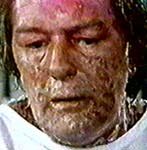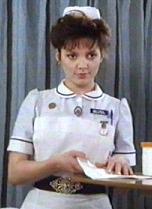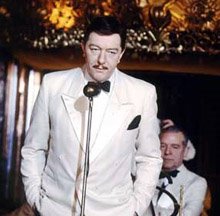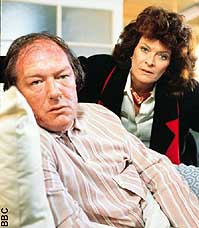 The Singing Detective (TV, 1986)
The Singing Detective (TV, 1986)Writer: Dennis Potter
Director: Jon Amiel
"There are songs to sing, there are feelings to feel, there are thoughts to think. That makes three things, and you can't do three things at the same time. The singing is easy, syrup in my mouth, and the thinking comes with the tune, so that leaves only the feelings. Am I right, or am I right? I can sing the singing. I can think the thinking. But you're not going to catch me feeling the feeling. No, sir."
--Detective Philip Marlow, The Singing Detective
In 1986, the 6-part miniseries The Singing Detective exploded onto British TV screens like a bomb during the Blitz--a bold, inventive exploration into the heart of darkness and the rise to redemption of one man, Philip E. Marlow, a writer of detective novels who suffers from a horrifying case of psoriatic arthropathy. Reactions were equally strong, and mixed. Some viewers decried the play (as writer Dennis Potter and his colleagues always called them) as obscene and an unpleasant way to relax at home. Others were moved by the raw emotional journey of a deeply troubled man. When the series came to U.S. television the following year, the raves were unanimous. Dennis Potter had conquered America.
Dennis Potter was the son of a miner who grew up in the Forest of Dean, on the English side of the border with Wales in Glochestershire. A rural, isolated place with a unique, archaic dialect, the Forest was Potter's refuge and creative source after he had left it for an education at Oxford and a successful career as a writer of television plays during the golden age of television drama at the BBC. While all of Potter's plays deal with his obsessions, particularly sex, The Singing Detective is his most autobiographical work.
Potter suffered from chronic psoriatic arthropathy, a disfiguring illness characterized
 by inflamed, flaking skin and pain and stiffness in the joints. Potter had to wear pajamas under his clothes with their pantlegs tucked into his socks to prevent a trail of dead skin from following him wherever he went. He spent considerable time in hospital, and that is where his stand-in, Marlow (Michael Gambon), spends the duration of this series, lost in a sea of memories, fever-induced delirium, and battles with patients, doctors, nurses, and his wife Nicola (Janet Suzman).
by inflamed, flaking skin and pain and stiffness in the joints. Potter had to wear pajamas under his clothes with their pantlegs tucked into his socks to prevent a trail of dead skin from following him wherever he went. He spent considerable time in hospital, and that is where his stand-in, Marlow (Michael Gambon), spends the duration of this series, lost in a sea of memories, fever-induced delirium, and battles with patients, doctors, nurses, and his wife Nicola (Janet Suzman).When we first encounter Marlow, it is on his admittance to the mockingly named Sherpa Tensay ward of a London hospital inhabited primarily by cardiac patients. Most have been confined to their beds there for a long time, and their peculiarities are on full display. Mr. Hall (David Ryall) is a fussy, lonely complainer who is irritated routinely with Reginald (Gerard Horan), whose bed is next to Hall's but who constantly has his nose in a detective novel. (Later, Reggie and Hall will be surprised that the author of the book Reggie is reading, The Singing Detective, has been sharing their ward with them.) We get an immediate sense of the boredom and rhythms of the ward as Hall squabbles to a half-listening Reggie and mumbles across the room at the loathsome Nurse White (Imelda Staunton), who has yet again started the beverage trolley rounds on the other side of the room.
 Marlow arrives bellowing in pain and yelling at the orderly to draw the curtains around his bed as he changes into his pajama top. When we see the horrible flaking on his back, we understand the humiliation Marlow must be feeling. It is compounded when the pretty Nurse Mills (Joanne Whalley) rubs grease on his thighs, causing him to have an erection and climax on her. He tries to explain, but only succeeds in embarrassing her and himself more. Marlow is emotionally and sexually repressed, and it is tempting to consider his outward appearance a reflection of an inner filth.
Marlow arrives bellowing in pain and yelling at the orderly to draw the curtains around his bed as he changes into his pajama top. When we see the horrible flaking on his back, we understand the humiliation Marlow must be feeling. It is compounded when the pretty Nurse Mills (Joanne Whalley) rubs grease on his thighs, causing him to have an erection and climax on her. He tries to explain, but only succeeds in embarrassing her and himself more. Marlow is emotionally and sexually repressed, and it is tempting to consider his outward appearance a reflection of an inner filth.Soon thereafter, a team of doctors comes to visit him. The senior physician asks questions of Marlow, only to be answered by the attending doctors who flank him. In a fit of pique, Marlow interjects, "Why is it when you lose your health the entire medical profession takes it as axiomatic you've also lost your mind?" and then begins a tearful, impassioned plea for understanding. The doctors, bone dry of the milk of human kindness, immediately discuss a mental health consult and start naming medications to improve his attitude. At this point, Marlow hallucinates an incredible production number to the song "Dry Bones" and featuring lip-synching and dancing doctors, nurses in white showgirl costumes, and gaudy lighting.
The musical numbers are a large part of this work, all songs from the 30s, and all lip-synched as Marlow's father used to do at a local Forest pub. Potter was a man who believed in the ideals expressed in these songs, that life really was full of love and purest longing. The contrasting of such tunes as "After You've Gone," "The Teddy Bear Picnic," and "We'll Meet Again," with the harsh realities of the ward, Marlow's condition, and the crucible traumas Marlow suffered as a boy both reflect and deflect real events.
 Marlow also writes a new Singing Detective novel in his head to pass the time, a tale of espionage that involves a client named Mark Binney (Patrick Malahide) who comes to the character of Detective Marlow after a Russian whore he met the night before in the Skinskapes nighclub and slept with ends up dead in the Thames. The imaginative scenes use the language of a Raymond Chandler novel, not the sort of thing Marlow had set out to write. When asked by Dr. Gibbon (Bill Paterson), the psychotherapist he finally agrees to see, what sort of writer he really would have wanted to be, Marlow gives the somewhat surprising answer that he would have wanted to write praises to a loving and merciful god. Yet he heaps contempt upon some evangelical Christians led by one of the doctors who invade the ward for a revival meeting. When the doctor loses his temper and says, "those who are not with us are against us," we realize that Marlow may not be as jaded as he seems and can smell a phony a mile away.
Marlow also writes a new Singing Detective novel in his head to pass the time, a tale of espionage that involves a client named Mark Binney (Patrick Malahide) who comes to the character of Detective Marlow after a Russian whore he met the night before in the Skinskapes nighclub and slept with ends up dead in the Thames. The imaginative scenes use the language of a Raymond Chandler novel, not the sort of thing Marlow had set out to write. When asked by Dr. Gibbon (Bill Paterson), the psychotherapist he finally agrees to see, what sort of writer he really would have wanted to be, Marlow gives the somewhat surprising answer that he would have wanted to write praises to a loving and merciful god. Yet he heaps contempt upon some evangelical Christians led by one of the doctors who invade the ward for a revival meeting. When the doctor loses his temper and says, "those who are not with us are against us," we realize that Marlow may not be as jaded as he seems and can smell a phony a mile away. Or can he? He is also filled with paranoia, particularly toward his wife, whom he believes is trying to steal a screenplay from him for her lover, Finney (Malahide), to pass off as his own to a Hollywood producer. This paranoid fantasy intercuts with memories Dr. Gibbon stirs of his childhood in the Forest, his parents' unhappy marriage, and an injustice he committed against a schoolmate that has haunted him all his life. The series intercuts each thread--the present, the hallucinations, the past, and the novel--as a kind of detective story of its own. We try to piece together the "truth" along with Marlow, and are fed clues--fragments of scenes that grow longer and more revealing as the series moves along and we watch Marlow progress physically and emotionally. It boggles the mind how Potter sustained and expanded upon all these threads over the course of nearly seven hours. The writing is literate and absolutely brilliant, and the cinematography and direction give us parallel movements (a raised hand reminds Marlow of his father [Jim Carter] waving good-bye at a train station) and line readings that can be interpreted in more than one way. He even leaves us with one "truth" about Philip's mother of which we may never be sure.
Or can he? He is also filled with paranoia, particularly toward his wife, whom he believes is trying to steal a screenplay from him for her lover, Finney (Malahide), to pass off as his own to a Hollywood producer. This paranoid fantasy intercuts with memories Dr. Gibbon stirs of his childhood in the Forest, his parents' unhappy marriage, and an injustice he committed against a schoolmate that has haunted him all his life. The series intercuts each thread--the present, the hallucinations, the past, and the novel--as a kind of detective story of its own. We try to piece together the "truth" along with Marlow, and are fed clues--fragments of scenes that grow longer and more revealing as the series moves along and we watch Marlow progress physically and emotionally. It boggles the mind how Potter sustained and expanded upon all these threads over the course of nearly seven hours. The writing is literate and absolutely brilliant, and the cinematography and direction give us parallel movements (a raised hand reminds Marlow of his father [Jim Carter] waving good-bye at a train station) and line readings that can be interpreted in more than one way. He even leaves us with one "truth" about Philip's mother of which we may never be sure.The cast is first-rate. I found Lyndon Davies, the young actor who plays Philip at age 10, particularly spellbinding. His earnest, open feelings and sad face while he prays to God from the top of a tree give the poignancy needed to feel sympathy for the adult Marlow at his most venomous. Michael Gambon's tour de force performance ranks among the finest you will ever see on stage, screen, or television.
A work of this magnitude has many, many surprises and rewards I will leave for the viewer to discover, not the least of which is the exquisite evocation of the Forest of Dean and its people. What is most important about The Singing Detective is the profoundly unsparing humanity it offers its audience. No, this is not a show of escapism. This is meat and sinew, bone and blood. This is nourishment for the mind and the soul, both of which were deeply precious to Potter. Thank goodness there was a time when television writers talked up, not down, to their audience. Let's hope such a time comes again. l
Dennis Potter contributed the screenplay for the 2003 film The Singing Detective, starring Robert Downey, Jr. This is a highly truncated, but still interesting work that I enjoyed. DVD recordings of The Singing Detective miniseries are available. The BBC Video version has a nice extras disc with reactions to the show from the time, an interview with Potter, and a short documentary about Potter, among other features. Finally, a viewing of Dennis Potter: The Last Interview is a must. A dig Potter gives Rupert Murdoch in The Singing Detective reaches its full flourish as he tells interviewer Melvyn Bragg that he has named his fatal cancer "Rupert."


0 Comments:
Post a Comment
<< Home